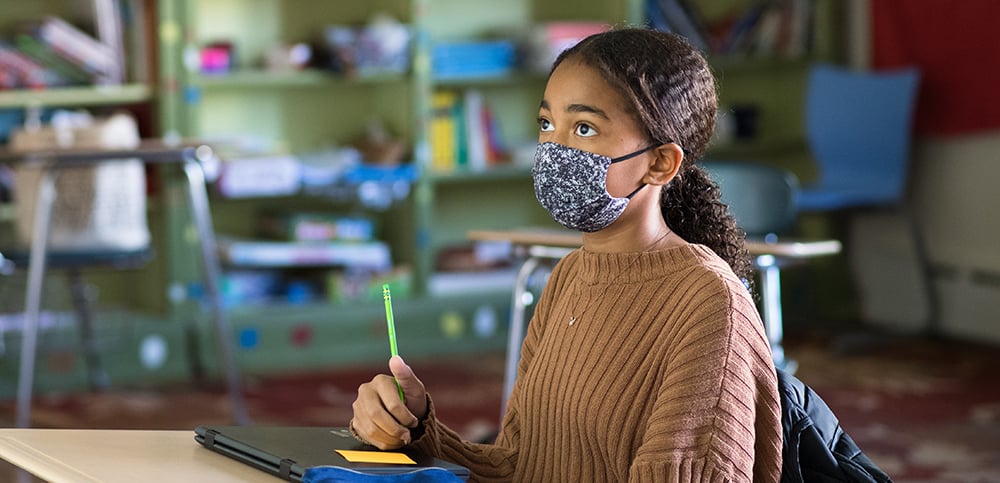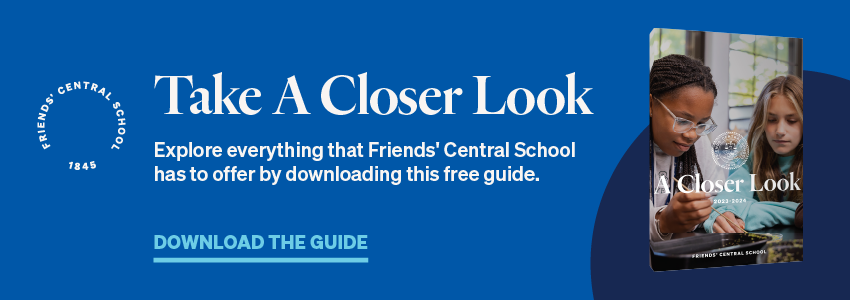
As parents, caregivers and educators, we know that we can’t always be there for our kids to help them problem solve and achieve their full potential. But we can do our best to help them develop the skills they’ll need for success and become independent learners.
Free Downloadable Guide: Take a Closer Look at Friends' Central School
What is Independent Learning?
Put simply, an independent learner feels empowered to take charge of their own learning, explore their interests, and ask meaningful questions. Not only is this important for children throughout their educational journey, but it’s also a key life skill that will set them up for success in adulthood.
The Importance of Independent Learning
As kids get older and advance through school and life, it’s only natural that they’ll need to become more independent. As your child progresses through lower school, middle school, high school, college, and beyond, they’ll be increasingly expected to take charge of their own learning and manage their responsibilities.
Actively making the effort to encourage independent learning from a young age is like removing the training wheels from a bike. As caregivers, it’s important to know the right way to take the training wheels off while still providing adequate support when needed.
There are numerous ways to encourage independent learning throughout everyday life, both at home and in the classroom. Below is a closer look at different strategies parents and families can use to encourage independent learning.
Encouraging Independent Learning
1. Create structure and routine.
One of the simplest ways to encourage independent learning is to establish structure and routine for your child. When it comes to completing school work, having a firm routine in place will help them build strong habits related to their studies.
2. Be curious together.
Modeling a sense of curiosity and a love of learning helps demonstrate what independent learning looks like in daily life and outside of the classroom. To model this behavior, think of ways to be curious together.
This might look like asking questions about books you’re reading together, taking a nature walk and learning about the different insects and animals you see along the way, and so much more.
3. Encourage questions.
Children are inherently curious, and our job as caregivers and educators is to encourage them to ask meaningful questions that will help them better understand the world around them.
In addition to modeling curiosity and problem solving, it’s also a great idea to provide your child with new learning opportunities whenever possible. For example, if your child shows interest in a particular topic, consider providing them with books, games, and other opportunities for them to explore their curiosity further.
4. Provide guidance, not answers.
Finally, just as it’s important to encourage thoughtful questions, it’s also important that you’re mindful of how those questions are being answered. A key component of encouraging independent learning is not only empowering your child to ask big questions, but also allowing them to explore ways of answering those questions themselves.
For this reason, be mindful of the way you help your child find the answers to their questions. Rather than simply providing answers, aim to guide their thought process so that they can discover a solution through their own reasoning and exploration.
Provide the necessary support by reminding your child what resources are available to them and how they might go about using their resources. Similarly, ask your child what they already know about a particular topic or question in order to help guide them to new information.
Independent Learning at FCS
Independent learners are nurtured at home and in the classroom. Choosing a school that recognizes the importance of academic agency and encourages students to explore their interests is another great way to ensure that your child feels empowered to reach their full potential.
At Friends’ Central School, we recognize the value of independent learning in our students and strive to provide opportunities for children to take charge of their education. Many of the strategies discussed above are continuously enacted by our educators to promote independent learning in the classroom while also providing students with the guidance and resources they need to be successful. Our students become self advocates and feel empowered to explore their curiosity in meaningful ways in school and beyond.



